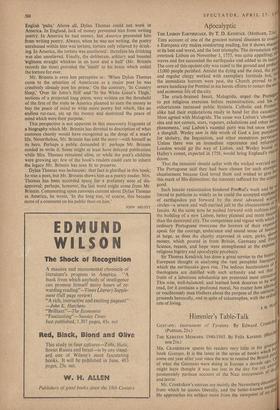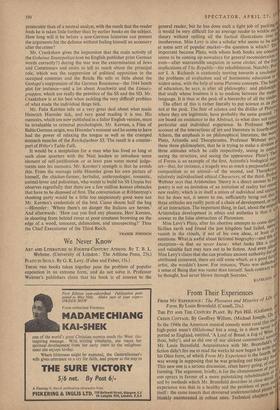Himmler's Table-Talk
tch MR. CRANKSHAW spares his readers very little in his gruesha, book Gestapo. It is the latest in the series of books whic"h „ come out year after year since the war to remind the British of what the Germans were doing in Europe a decade a8°•01 might haye thought it was too late in the day for yet u'lAea passionately partisan account of the Nazi instruments of and ea.
terror. nen'
Mr. Crankshaw's sources are mainly the Nuremberg doeni air from which he quotes liberally, and the better-known me spit' He approaches his subject more from the viewpoint of an prosecut6r than of a neutral analyst, with the result that the reader' finds he is taken little further than by earlier books on the subject. How long will it be before a non-German historian can present the arguments for the defence without feeling himself an accessory after the crime?
Mr. Crankshaw gives the impression that the main activity of the Geheime Staatspolizei (can no English publisher print German words correctly?) during the war was the extermination of Jews and Commissars and omits to tell us much about the principal role, which was the suppression of political opposition in the occupied countries and the Reich He tells us little about the Gestapo's suppression of the German Resistance—the 1944 bomb plot for instance—and a lot about Auschwitz and the Einsatz- gruppen, which are really the province of the SS and the SD. Mr. Crankshaw is at his best when tackling the very difficult problem of what made the individual thugs tick.
Mr. Felix Kersten tells us a very great deal about what made Heinrich Himmler tick, and very good reading it is too. His memoirs, which are now published in a fuller English version, must be invaluable to criminal psychologists. Mr. Kersten, a Finn of Baltic German origin, was Himrnler's masseur and he seems to have had the power of relaxing the tongue as well as the cramped stomach muscles of the Reichsfuehrer SS. The result is a counter- part of Hitler's Table-Talk.
It would be a temptation for a man who has lived so long at such close quarters with the Nazi leaders to introduce some element of self-justification or at least pass some moral judge- ments into his memoirs. Mr. Kersten's strength is that he avoids this. From the massage table Himmler gives his own picture of himself, the chicken-farmer, herbalist, anthropologist, romantic, animal-lover and policeman, who wants to build his SS Utopia but observes regretfully that there are a few million human obstacles that have to be disposed of first. The conversation at Ribbentrop's shooting party would be a little too suspiciously good were not Mr. Kersten's credentials of the best. Ciano shoots half the bag —Himmler: 'Where there's no danger the Italians are heroes.' And afterwards : 'How can you find any pleasure, Herr Kersten, in shooting from behind cover at poor creatures browsing on the edge of a wood, innocent, defenceless, and unsuspecting?' Thus the Chief Executioner of the Third Reich.
FRASER JOHNSON











































 Previous page
Previous page